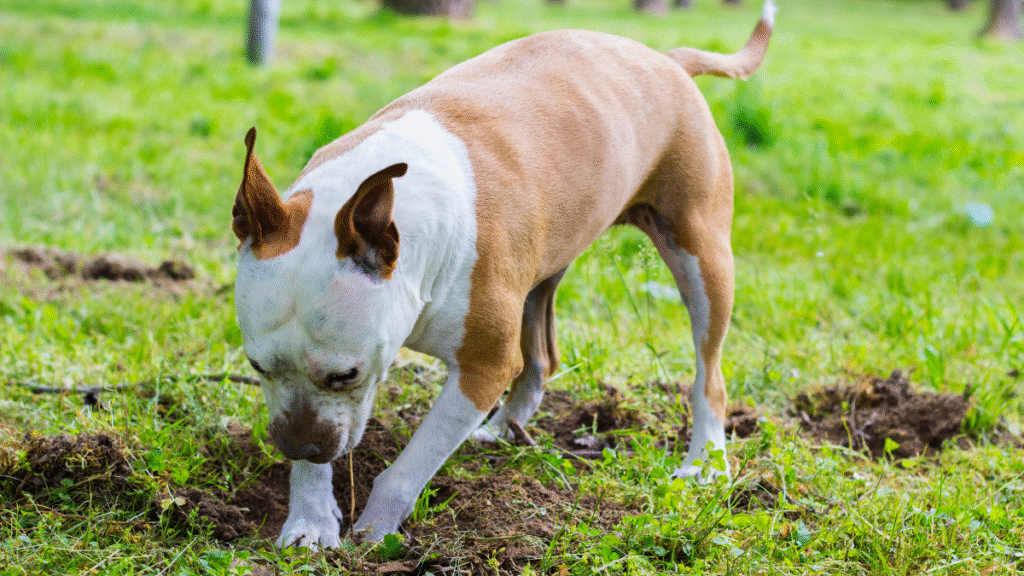Digging holes is one of the most common behavioral problems dog owners face. Nothing ruins your day more than stepping outside to greet your dog and finding your yard turned into a moonscape of craters and holes.
While it can be frustrating when your dog’s digging instincts take over, it’s important to remember that they don’t mean to destroy your yard. Dogs naturally love to dig because it’s an instinctive behavior that has been in their genes for thousands of years.
That said, there’s no reason your dog should continue to turn your yard into a crater field either.
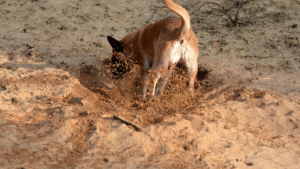
Why Do Dogs Dig Holes?
Figuring out exactly why your dog is digging is the first step toward stopping the behavior. Dogs dig for many reasons. Once you understand what motivates your dog, it becomes much easier to choose the most effective training methods and deterrents.
Some of the main reasons dogs dig holes in yards or gardens include:
-
Attention-seeking
-
Boredom or loneliness
-
Temperature regulation
-
Escaping from perceived threats or predators
-
Preparing a den for new puppies
-
Hunting prey such as rodents or insects
-
Playing or unearthing hidden toys or bones
-
Burying food, bones, or toys
Once you narrow down the most likely reason, you can train your dog to stop digging and redirect their energy and instincts into more appropriate activities.
1. Provide Enough Exercise and Mental Stimulation
A lack of physical and mental exercise is one of the main reasons dogs dig holes. Many dogs—especially working or high-energy breeds—need regular activity to stay calm and focused. Without an outlet for their energy, dogs can become frustrated or bored and start looking for ways to entertain themselves, such as digging.
Solution:
-
Take your dog for longer or more frequent walks.
-
Play interactive games such as fetch or tug-of-war.
-
Use puzzle toys and treat-dispensing toys to challenge their mind.
-
Rotate your dog’s toys every few days to keep things interesting.
-
Alternate yard activities between potty breaks, playtime, and rest.
When your dog has plenty of exercise and stimulation, they’re far less likely to dig out of boredom or frustration.
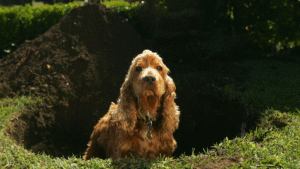
2. Create a Designated Digging Zone
Digging is natural canine behavior, so trying to eliminate it completely can be frustrating for both you and your dog. Instead, redirect it. Giving your dog a designated area where digging is allowed works particularly well for breeds with strong digging instincts, such as Terriers and Dachshunds.
Solution:
-
Choose a specific spot in your yard or garden and fill it with loose soil or sand.
-
Bury toys, treats, or bones in that area.
-
Praise your dog when they dig in the right spot.
-
If they dig elsewhere, gently lead them back to the designated area.
Your dog will soon learn that this is the only approved place to dig.
3. Make Problem Areas Less Appealing
If your dog consistently digs in specific areas—such as around fences, flower beds, or near trees—you can use natural deterrents to make those spots less appealing.
Natural deterrents include:
-
Placing rocks or chicken wire just beneath the ground’s surface. This makes digging uncomfortable but not harmful.
-
Spraying a safe deterrent that smells strongly of citrus or vinegar (test a small patch first to ensure it doesn’t damage plants).
-
Covering the area with garden decorations, mulch, or netting until your dog loses interest.
-
Reinforcing boundaries by adding fencing or landscaping obstacles to block access.
These simple, humane deterrents make it less rewarding and more difficult for your dog to continue digging in unwanted areas.

4. Address Anxiety and Emotional Triggers
Digging can also be a sign of anxiety, fear, or frustration. This is especially common in dogs left alone for long periods, those frightened by loud noises such as thunderstorms, or dogs lacking proper mental stimulation.
Signs your dog may be digging due to anxiety:
-
Digging primarily occurs when you leave the house.
-
It’s accompanied by whining, pacing, or destructive chewing.
-
Digging happens mostly near doors, windows, or fences.
Solution:
-
Use gradual desensitization training to help your dog become comfortable being alone.
-
Provide a safe, comfortable indoor space with toys and calming background music.
-
Try crate training if your dog is already crate-trained.
-
Spend quality time together every day to strengthen trust and reduce stress.
-
For severe anxiety, consult a professional dog trainer or veterinary behaviorist.
5. Keep Your Dog Cool and Comfortable
Dogs sometimes dig to cool off in hot weather or to create an insulated space in cold weather. In summer, they dig to reach cooler soil; in winter, they may dig to make a warm den.
Solution:
-
Always provide your dog with shade and fresh water when they’re outdoors.
-
Consider using a cooling mat or sheltered doghouse.
-
Bring your dog indoors during extreme temperatures.
-
Avoid leaving your dog outside unsupervised for long periods.
Keeping your dog comfortable removes one of the key motivations for digging.
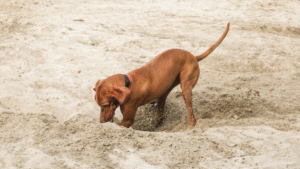
6. Avoid Unintentional Reinforcement
If you rush over, yell, or make a big deal when your dog digs, they may interpret that attention—positive or negative—as a reward. Dogs repeat behaviors that get attention, even if it’s scolding.
Solution:
-
Stay calm when you catch your dog digging.
-
Redirect their energy to an appropriate activity, such as a toy or play session.
-
Praise and reward your dog when they choose not to dig.
-
Be consistent—mixed messages can confuse your dog and reinforce bad habits.
Consistency and calm redirection are key to changing this behavior.
7. Seek Professional Help If Needed
If your dog continues to dig despite your best efforts, it may be time to consult a certified dog trainer or behaviorist. Persistent digging can sometimes indicate deeper behavioral or medical issues, such as anxiety disorders or hormonal imbalances.
A professional can help you:
-
Observe your dog’s environment and behavior.
-
Identify triggers you may have missed.
-
Design a personalized training plan.
-
Teach you effective positive reinforcement techniques for long-term success.
For Some Breeds, Digging Can’t Be Stopped Entirely
Certain breeds, such as Terriers and Dachshunds, are natural diggers. While you may not be able to stop them from digging completely, you can train them to dig only in designated areas and at appropriate times. By using deterrents and redirecting their behavior, you can protect your yard without frustrating your dog’s instincts.
FAQs
Does vinegar stop dogs from digging?
Yes. Spraying a vinegar and water mixture around problem areas can deter many dogs because they dislike the smell.
Does cinnamon stop dogs from digging?
Yes. Dogs generally dislike the smell of cinnamon, so sprinkling it lightly around your yard may help discourage digging.
What smell do dogs hate?
Most dogs dislike citrus and vinegar scents.
How can I make my yard unattractive to dogs?
Use rocks, boulders, gravel, mulch, garden decorations, or other natural materials to cover exposed soil and make your yard less inviting for digging.
Wrap-Up
Dogs don’t dig without reason. Whether it’s to regulate temperature, cope with anxiety, seek attention, or simply relieve boredom, every digging behavior has an underlying cause. Training your dog to stop digging requires patience, consistency, and understanding. Instead of punishment, focus on redirection, positive reinforcement, and providing suitable alternatives.
Save pin for later
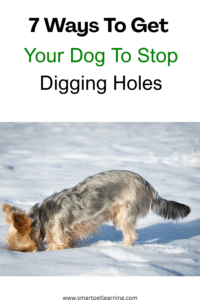
- Fun Brain Games for Smart Dogs - December 29, 2025
- How to Socialize Your Dog Safely - December 29, 2025
- Secrets to a Well-Behaved Dog - December 29, 2025
